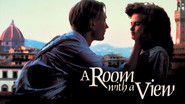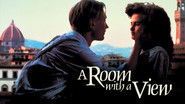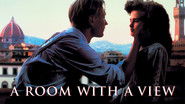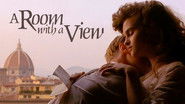James Hitchcock
"A Room with a View" was part of the great E. M. Forster cycle of the eighties and early nineties when, starting with David Lean's "A Passage to India" from 1984, five of his six novels were turned into films. Three of these- this one, "Maurice" and "Howard's End"- were directed by James Ivory and produced by Ismail Merchant. Some films bear little resemblance to the books on which they are ostensibly based, but Merchant and Ivory follow their literary source quite closely, even dividing the film into sections corresponding to Forster's chapters.The film is set in during the Edwardian period in England and Italy, although all the major characters are English. The plot can be summarised as "two boys love one girl". The girl is Lucy Honeychurch, daughter of a wealthy upper-middle class English family. The boys are her fiancé Cecil Vyse and George Emerson, a handsome young man whom she meets on holiday in Italy.Forster was touching on a theme with which he was to deal at greater length in his next novel, "Howard's End", a theme which was also a preoccupation of his German contemporary Thomas Mann, namely the contrast between the "artistic" and "bourgeois" attitudes to life. In "Howard's End" the two sides are represented by the cultured Schlegel family (with whom Forster's sympathies clearly lie) and the solidly Philistine Wilcoxes. Here, however, the emphasis is rather different. The artistic side is represented by Cecil, a supercilious cultural snob whom Forster may have been using to satirise the pretensions of the Aesthetic Movement. Although the bourgeois Honeychurches can also be snobbish, they are less pretentious, and Lucy herself, a gifted pianist with a passion for classical music, is far from uncultured. (The same cannot, however, be said for her mother Marion and her loud, brash brother Freddy).Another important theme is the way in which the values of the old century are giving way to those of the new. The old Victorian era is associated with adherence to social convention and emotional repression, the new Edwardian one with a more free-spirited and emotionally liberated attitude. This distinction is not, however, necessarily the same as the difference between old and young. There are free-thinking, unconstrained older people, such as George's eccentric father, and more emotionally reticent younger ones, such as Lucy who finds it difficult to give free expression to her feelings, at least in words. (She has no problem in expressing them through her music).The two performances I liked least came from Denholm Elliott and Julian Sands as the two Emersons, father and son. I know that Elliott tried hard to make old Mr Emerson lovably unconventional, but I was left with the impression that he would have been unbearably irritating in real life. Sands came across as pleasant but a bit too bland for the hero of a romantic drama. I certainly could have done without that scene in which George, Freddy and the local vicar all splash about naked in a pool, a heavy-handed way of emphasising the young men's boisterousness and free spirits.On the positive side, I liked Helena Bonham-Carter as Lucy, Maggie Smith as Marion's uptight cousin Charlotte who acts as Lucy's companion and chaperone in Italy, and Daniel Day-Lewis as Cecil. Bonham-Carter was at the start of her acting career, but she gave great promise for the future. (She was to become something of a specialist in period dramas and appeared in two more Forster adaptations, "Where Angels Fear to Tread" and "Howard's End"). On the surface, Cecil seems to be a one-dimensional character, a caricature of the self-satisfied and opinionated culture-vulture, but Day-Lewis is able to suggest that this surface may be a mere façade. Cecil's aestheticism may be just another form of emotional repression. He has no problem with expressing his views on art or literature, but expressing his deeper feelings is another matter. When Lucy breaks off her engagement to him on the grounds that he has no deeper feelings, at least for people as opposed to objects, I felt she may have been doing him an injustice.As one might expect from Merchant/Ivory, the film is visually beautiful and makes good use of its location settings, whether in Florence or in the Kent countryside. (Lucy's home village, Summer Street, is supposedly in Surrey but these scenes were actually shot in Chiddingstone, Kent). It also makes good use of music, especially Puccini's aria "O My Beloved Father" (perhaps less over-familiar in the mid-eighties than it is today) which sounds wonderfully appropriate to the Italian settings, even if it was not written until a decade after Forster's novel.One criticism I have heard of the film is that "nothing happens". Although it is certainly true that there is little in the way of physical action, and fewer dramatic developments than in, say, "A Passage to India" or "Howard's End", this is not a criticism I accept. On an emotional level there is actually a lot going on. As roger Ebert pointed out, "It is an intellectual film, but intellectual about emotions: It encourages us to think about how we feel, instead of simply acting on our feelings". This sort of emotional intelligence is not always easy to convey in the cinema- it is probably easier to do it via the written word- but I think that Merchant and Ivory succeed in doing it here. 8/10 A goof. There is a curious inconsistency about the pronunciation of Cecil's name. Most of the characters pronounce it as "Sissil", but George insists on "Sessil", even though he knows Cecil personally. Also, "Powell" (the name of one of the servants) is pronounced by some characters to rhyme with "Cole" and by others to rhyme with "Cowell".
MartinHafer
The film is a story about manners--very, very, very proper and stuffy British manners during the Edwardian era. As a result of convention, Lucy (Carter) and George (Sands) are kept apart.Partway through watching "A Room With a View", I realized that, believe it or not, the underlying theme is the same as you'll find in "Jane Eyre"....seriously. Both concern social conventions and morality versus happiness and romantic passion. In the case of Jane, her love (Mr. Rochester) was not technically able to marry her and so she ran off--and lived, for a time, with a man in training to be a missionary and his family. The missionary had no passion at all for Jane but proposed--a marriage of convenience and intellect. Should she choose this good man or live with a man already married (Rochester)--albeit, his marriage was clearly a fraud perpetrated on him. Likewise, in "A Room With a View", Helena Bonham Carter's character must choose between a more worldly (and rather non-religious) Julian Sands or the incredibly stodgy and respectable fiancé (Daniel Day-Lewis). Either a marriage of predictability and convention or a marriage with passion, and, perhaps, irrespectability are her apparent choices. Now I am NOT complaining that the themes are the same...after all, "Jane Eyre" is one of my very favorite books (and is MUCH better than the movie versions).Some things to look for in this film--the gorgeous views of Florence, the lovely score and the funny (but very explicit) skinny-dipping scene. Clever and enjoyable...but also perhaps a bit slow due to its commentary about manners.










